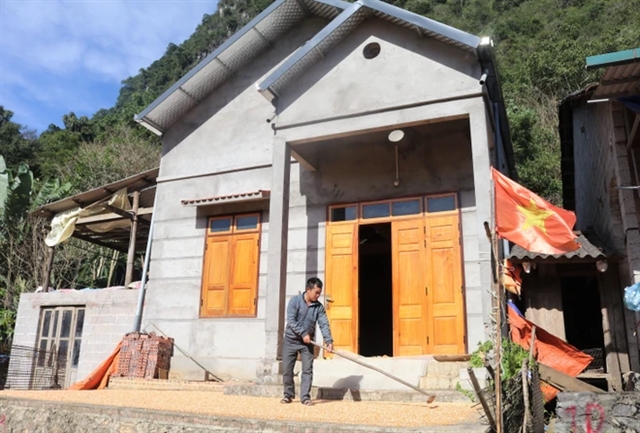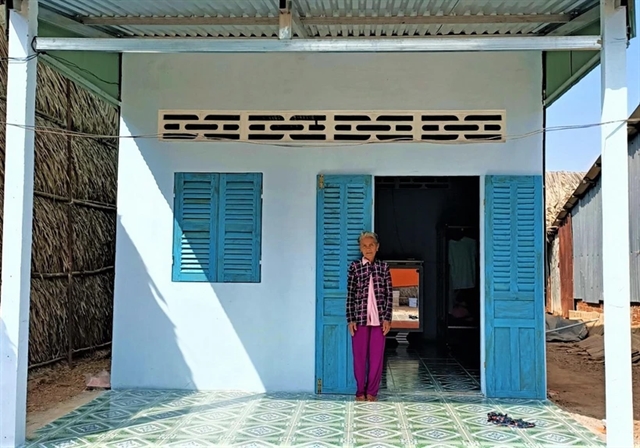
|
| Nông Hoàng Quỳnh’s household in Hạ Long, Cao Bằng province was supported with a new house in the campaign to eliminate temporary housing. — VNA/VNS Photo Chu Hiệu |
HÀ NỘI — According to some National Assembly deputies, the disbursement of housing funds is alarmingly low, and several regions find it challenging to mobilise resources to meet the plan of eliminating temporary housing for the poor by 2026.
Despite the allocation of significant funds in 2023 for Project 5, which supports housing for poor and near-poor households in impoverished districts, the implementation results have been disappointingly low, and many National Assembly deputies have pointed out shortcomings in the project.
Delayed fund allocation and low disbursement
In 2023, Project 5 for supporting housing in poor and near-poor households in impoverished districts was allocated over VNĐ1.125 trillion (US$46.3 million).
The National Target Programme for Sustainable Poverty Reduction for the period 2021-2025 aims to provide housing support to a minimum of 100,000 poor and near-poor households in impoverished districts, ensuring safe, stable, disaster-resistant housing, contributing to improving the quality of life and sustainable poverty reduction. The target for the year 2023 is to support 25,500 households.
However, according to the Government’s report, in the first seven months of 2023, only 6,051 houses were supported, with 4,406 newly built and 1,645 repaired. The disbursement results for the first six months of the year from the central budget were VNĐ196.188 billion ($8 million), reaching only 19.23 per cent.
Đỗ Thị Lan, a deputy from Quảng Ninh, stated that the work of supporting housing for the poor, near-poor, and newly impoverished households is progressing very slowly. If the pace is not accelerated, it is estimated to reach only 39.7 per cent of the Project 5 plan by the end of 2023. Disbursement is also significantly low, and some regions find it challenging to mobilise resources to meet the plan of eliminating temporary housing for the poor by 2026.
According to reports from localities such as Bắc Kạn, Quảng Nam, Bình Định and Cần Thơ, the central government’s slow allocation of funds and delayed issuance of guidelines for implementing poverty reduction housing support policies have led to difficulties in organising implementation.
According to Minister of Labour, Invalids, and Social Affairs Đào Ngọc Dung, this comprehensive poverty reduction programme allocated VNĐ4 trillion ($164.7 million) to focus on resolving over 100,000 houses for the poor in 74 impoverished districts.
By early 2023, the Ministry of Finance (MOF) and the Ministry of Labour, Invalids, and Social Affairs (MOLISA) had only agreed on the plans, thus the actual allocation of this fund began in 2023.
“We are in discussions with the Ministry of Finance to reach an agreement and present it to the National Assembly, striving to completely resolve these 100,000 houses in this term. This funding directly supports this, so there is a good chance we will achieve it. However, there are still many issues in building houses, such as normal psychological issues or choosing the end of the year and choosing the age. So, we also need perseverance, but the spirit will support us in achieving the goal,” said Dung.

|
| A household in Trần Đề, Sóc Trăng province was supported with a new house. VNA/VNS Photo Tuấn Phi |
Several shortcomings
According to the Prime Minister’s Decision 02/2022/QĐ-TTg, the support norm for new construction is VNĐ40 million per household ($1,647), and for house repairs, it is VNĐ20 million ($823.5) from the central budget.
However, many opinions suggest that the support norm is insufficient to meet the requirements of the “3 solid” criteria (solid foundation, solid frame-walls, solid roof) and the lifespan of the house for over 20 years, as specified in the National Target Programme.
Chu Thị Hồng Thái, Deputy Head of the Provincial Farmers’ Union office in Lạng Sơn Province, said being a poor household struggling to afford daily meals, having to come up with matching funds to complete the house to meet the “three solid” criteria is an extremely difficult and unsolvable issue. The support funds from many localities are not effectively implemented.
Thái suggested the government study and consider increasing the housing support to 70-80 per cent of the home value to meet the criteria for poor households.
According to MOLISA, in terms of housing support for the poor, outside of the support from the government, localities contribute from 10 to 30 per cent, with support from philanthropists.
Dung added that there are still over 400,000 underprivileged households nationwide. The Central Committee for Emulation and Reward has agreed and coordinated with the Chairman of the Central Committee of the Việt Nam Fatherland Front along with the government to launch the emulation movement “The whole country joins hands with the poor” to eliminate makeshift housing.
Additionally, at the 13th Party Central Committee’s 8th plenum held last October, it was agreed that during this term, from now until 2030, 1 million apartments would be built for workers and labourers, and by 2030, all dilapidated and temporary houses for the people will be completely eliminated. — VNS
- Reduce Hair Loss with PURA D’OR Gold Label Shampoo
- Castor Oil Has Made a “Huge” Difference With Hair and Brow Growth
- Excessive hair loss in men: Signs of illness that cannot be subjective
- Dịch Vụ SEO Website ở Los Angeles, CA: đưa trang web doanh nghiệp bạn lên top Google
- Nails Salon Sierra Madre
 VnExpress News The News Gateway of Vietnam
VnExpress News The News Gateway of Vietnam





